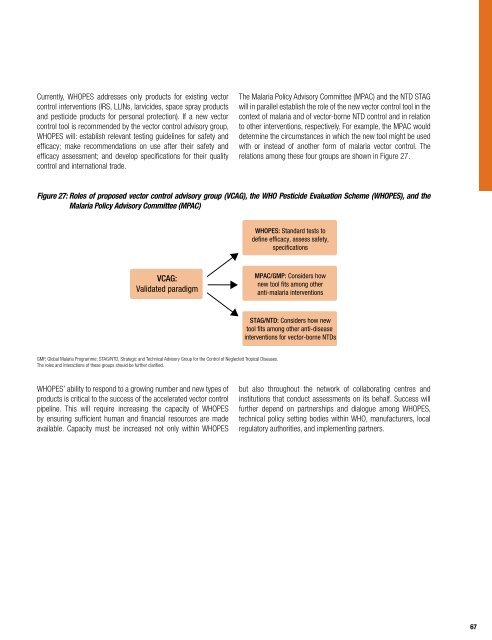Global plan for insecticide resistance management in malaria vectors
Global plan for insecticide resistance management in malaria vectors
Global plan for insecticide resistance management in malaria vectors
- No tags were found...
Create successful ePaper yourself
Turn your PDF publications into a flip-book with our unique Google optimized e-Paper software.
Currently, WHOPES addresses only products <strong>for</strong> exist<strong>in</strong>g vectorcontrol <strong>in</strong>terventions (IRS, LLINs, larvicides, space spray productsand pesticide products <strong>for</strong> personal protection). If a new vectorcontrol tool is recommended by the vector control advisory group,WHOPES will: establish relevant test<strong>in</strong>g guidel<strong>in</strong>es <strong>for</strong> safety andefficacy; make recommendations on use after their safety andefficacy assessment; and develop specifications <strong>for</strong> their qualitycontrol and <strong>in</strong>ternational trade.The Malaria Policy Advisory Committee (MPAC) and the NTD STAGwill <strong>in</strong> parallel establish the role of the new vector control tool <strong>in</strong> thecontext of <strong>malaria</strong> and of vector-borne NTD control and <strong>in</strong> relationto other <strong>in</strong>terventions, respectively. For example, the MPAC woulddeterm<strong>in</strong>e the circumstances <strong>in</strong> which the new tool might be usedwith or <strong>in</strong>stead of another <strong>for</strong>m of <strong>malaria</strong> vector control. Therelations among these four groups are shown <strong>in</strong> Figure 27.Figure 27: Roles of proposed vector control advisory group (VCAG), the WHO Pesticide Evaluation Scheme (WHOPES), and theMalaria Policy Advisory Committee (MPAC)WHOPES: Standard tests todef<strong>in</strong>e efficacy, assess safety,specificationsVCAG:Validated paradigmMPAC/GMP: Considers hownew tool fits among otheranti-<strong>malaria</strong> <strong>in</strong>terventionsSTAG/NTD: Considers how newtool fits among other anti-disease<strong>in</strong>terventions <strong>for</strong> vector-borne NTDsGMP, <strong>Global</strong> Malaria Programme; STAG/NTD, Strategic and Technical Advisory Group <strong>for</strong> the Control of Neglected Tropical Diseases.The roles and <strong>in</strong>teractions of these groups should be further clarified.WHOPES’ ability to respond to a grow<strong>in</strong>g number and new types ofproducts is critical to the success of the accelerated vector controlpipel<strong>in</strong>e. This will require <strong>in</strong>creas<strong>in</strong>g the capacity of WHOPESby ensur<strong>in</strong>g sufficient human and f<strong>in</strong>ancial resources are madeavailable. Capacity must be <strong>in</strong>creased not only with<strong>in</strong> WHOPESbut also throughout the network of collaborat<strong>in</strong>g centres and<strong>in</strong>stitutions that conduct assessments on its behalf. Success willfurther depend on partnerships and dialogue among WHOPES,technical policy sett<strong>in</strong>g bodies with<strong>in</strong> WHO, manufacturers, localregulatory authorities, and implement<strong>in</strong>g partners.67
















